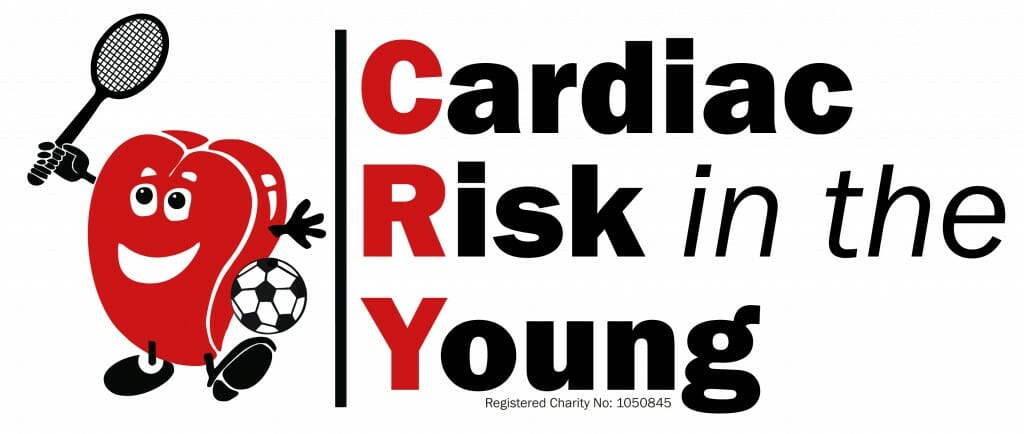CRY’s Research Fellows – both past and present – spend much of their time writing and submitting manuscripts based on their projects as well as travelling to UK and international conferences to present their key findings and to lead discussions which help to further the understanding of the causes of young sudden cardiac death (YSCD)
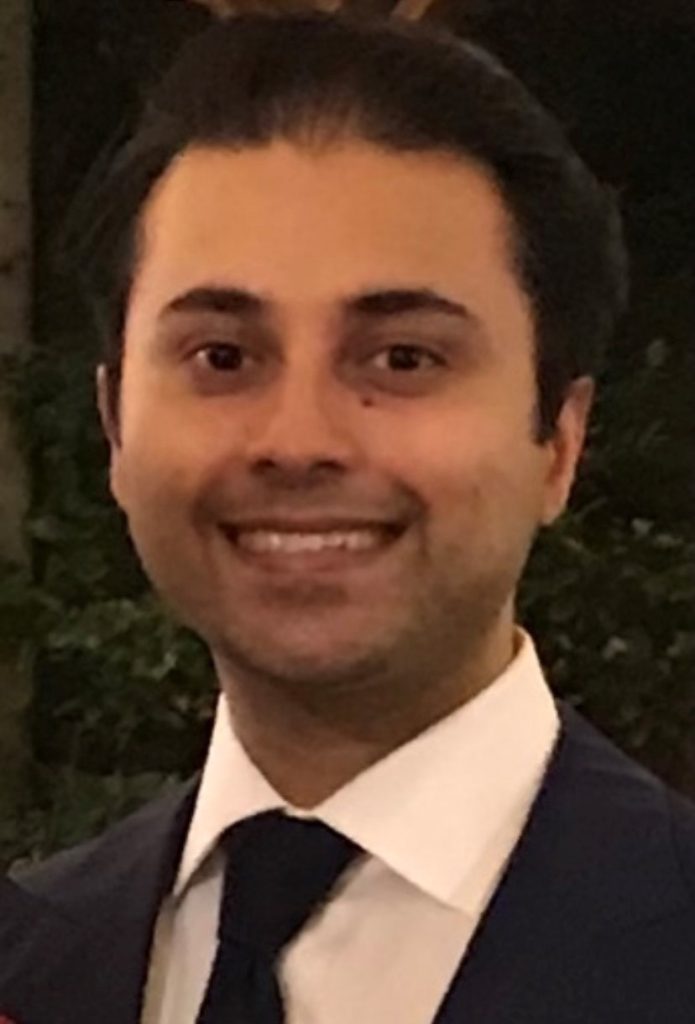
And, as another of CRY’s inspiring Research Fellows concludes a 3-year tenure with our team based at St George’s, University of London, we’re delighted to announce that Dr Raghav Bhatia was recently awarded “Best of the Best” – for the second time running! – at the 2023 British Cardiovascular Society (BSC) held in Manchester at the start of June.
And, during his time as a CRY Research Fellow, Dr Bhatia (who has now returned to a clinical role in Yorkshire, currently working with in the Cardiology Department at Hull University Teaching Hospitals NHS Trust) often went above and beyond in his support for CRY. His involvement included taking part in many media interviews on behalf of the charity, attending numerous screenings across all corners of the UK and being an active member of the “Running for Research” team, who not only trained together during their busy schedule at St George’s but also helped to raise over £10,000 in sponsorship!
Here, we chat to him to find more about this award-winning study and how its findings will help to improve and inform CRY’s nationwide screening programme.
Firstly, congratulations on your recent award at the British Cardiovascular Society (BSC) in the ‘Best of the Best’ category. Can you briefly describe the focus and objectives of this piece of research that you were recognised for?
Thank you very much. It was truly an honour to receive the cardiomyopathy ‘Best of the Best’ award at the BCS for the second consecutive year. The research for which I was recognised forms an integral part of my PhD thesis, which centres around the prevention of young sudden cardiac death.
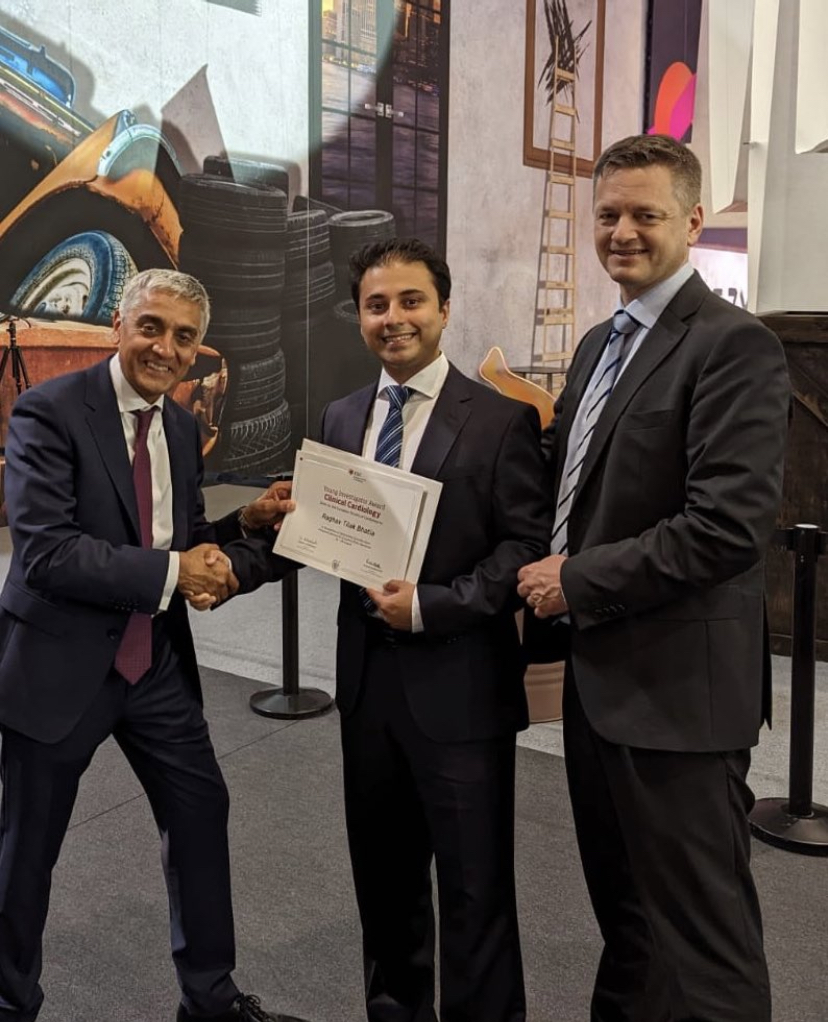
The specific focus of this project was to gain a deeper understanding of cardiac and sudden death in young individuals, using novel insights from the Office for National Statistics in England and Wales. The background to this topic was rooted in the importance of accurately representing the incidence and underlying causes of cardiac and young sudden cardiac death in individuals under 35 years of age and we analysed ONS data from 2013 to 2021 (focusing on a 9-year period, within an incredible 20-year cohort of unique, CRY-data). Additionally, we aimed to investigate temporal trends in mortality data, which has not been previously reported. By shedding light on these aspects, our research aimed to make valuable contributions to the understanding and prevention of young sudden cardiac death.
Such an accurate representation is crucial for healthcare policy makers to effectively allocate resources, address issues such as screening for potentially lethal conditions, improving post-mortem evaluations and enhancing resuscitation facilities. This topic built upon the existing work published by Professor Papadakis and Professor Sharma in 2009 which has significantly contributed to the CRY screening programme over the past decade. The main findings of this research have been really quite significant in terms of our current understanding of the incidence of young sudden cardiac death and the most frequent causes of cardiac mortality in young people. Our manuscript will be submitted soon for peer review, and everyone involved in the research looks forward to sharing these findings once published.
What does it mean to you to be recognised for your research at national and international meetings and how do you ensure productivity?
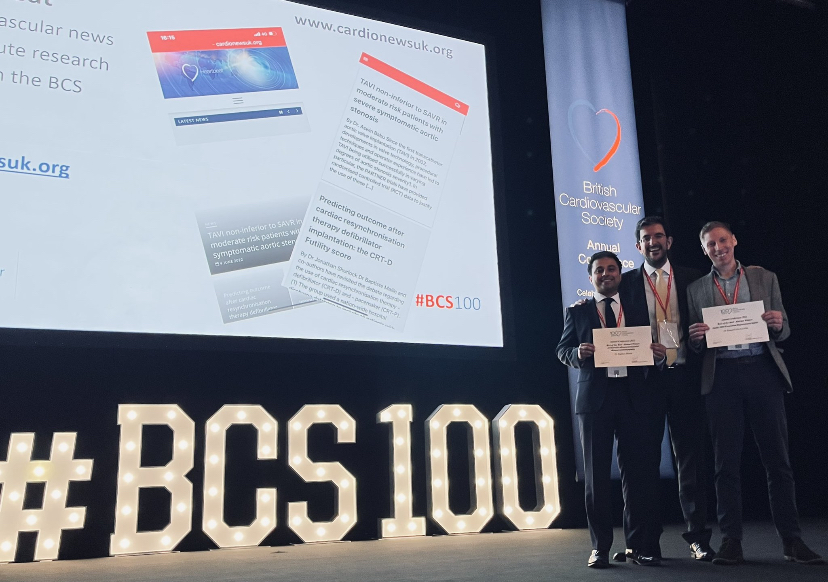
Being recognised for our research at national and international meetings holds immense significance. It demonstrates that our findings are respected, appreciated and contribute to the advancement of knowledge in the field. The opportunity to showcase our research conducted at CRY not only highlights the significance of our work but also fosters collaboration, suggestions, and ideas for future work. Most importantly, being recognised at these esteemed gatherings provides hope to the CRY families who have supported my research journey and Fellowship.
My approach to clinical research has always been centred around our patients and addressing key, unanswered questions. The recognition I have received is the result of a lot of hard work, which I would like to emphasise has always been a team effort, facilitated by my incredibly supportive colleagues and mentors in London and East Yorkshire, as well as my family, who have been a tremendous pillar of support throughout the rigours and challenges of academia.
In addition to the above research award, can you tell us which of your other research outputs have been presented at national and international award categories in the last 24-months?
Over the past 24 months, there have been several research works led by myself and collaborative efforts with my peers at St. George’s. For example, I am honoured to have received recognition and awards for the following research outputs:
- British Cardiovascular Society, Best of the Best cardiomyopathy section, 2023 (Manchester, UK): Understanding Cardiac and Sudden Death in Young Individuals: Novel Insights from the Office for National Statistics (ONS) in the United Kingdom.
- European Association of Preventative Cardiology, Young Investigator Awards, 2023 (Malaga, Spain): Prevalence and diagnostic significance of de-novo 12-lead electrocardiogram patterns following COVID-19 infection in elite soccer players.
- European Society of Cardiology, Young Investigator Awards (Barcelona, Spain): Sudden cardiac death during exercise in young individuals with hypertrophic cardiomyopathy.
- British Cardiovascular Society, Young Investigator Awards, 2022 (Manchester, UK): Prevalence and diagnostic significance of de-novo 12-lead electrocardiogram patterns following COVID-19 infection in elite soccer players.
- British Cardiovascular Society, Best of the Best cardiomyopathy section, 2022 (Manchester, UK): 1) Mitral valve abnormalities in decedents of sudden cardiac death due to hypertrophic cardiomyopathy and idiopathic left ventricular hypertrophy. 2) Prevalence and diagnostic significance of de-novo 12-lead electrocardiogram patterns following COVID-19 infection in elite soccer players.
I have also enjoyed contributing to the annual CRY International Conference from 2020 to date.
What are your next research topics focussed around?
My future research outputs remain focussed on cardiac screening and the prevention of young sudden cardiac death. For example, I am currently leading two exciting areas of research, which are near completion.
Firstly, I am delving into the field of myocarditis and its association with sudden cardiac death, particularly in the community i.e., non-hospitalised individuals. This project aims to provide valuable clinical and pathological insights, drawing from the expertise and resources available at the CRY Centre for Cardiac Pathology (CRY CCP). Our objective is to contribute to a better understanding of myocarditis-related cardiac events and potentially identify strategies for prevention and improved management.
Secondly, I am in the final stages of a large research project focused on the outcomes of cardiac screening in elite rugby players in the UK. This project aims to shed light on the effectiveness of screening protocols, identify potential risk factors, and explore ways to optimise the cardiac health of these athletes. We aim to contribute to evidence-based recommendations for screening practices in elite sports, ultimately ensuring the well-being and safety of athletes.
If we roll back time, why did you decide to apply for a CRY Research Fellowship?
From the early years of my medical career as a junior doctor, I had a strong desire to dedicate a specific period of time to research while also developing expertise in a niche and emerging clinical field. It was during this time that I became aware of the CRY Research Fellowship, which offered a unique opportunity to pursue both of these goals simultaneously.
The Fellowship offered the opportunity to work under the mentorship and guidance of renowned experts in the field, Professor Sanjay Sharma and Professor Michael Papadakis. So, in 2019, after speaking to several past and current CRY Fellows at the time, which included Dr Joyee Basu, Dr Rajay Narain, Dr Gemma Parry-Williams and Prof Aneil Malhotra, I made the decision to apply for the highly competitive CRY Research Fellowship. Following a rigorous selection process, I was fortunate enough to be awarded the fellowship, and my tenure as a CRY Fellow began in February 2020, just prior to the onset of the COVID-19 pandemic.
The Fellowship has provided me with an invaluable platform to expand my knowledge base and make meaningful contributions to the field of preventive cardiology. Working alongside esteemed mentors and within the supportive CRY framework has allowed me to not only engage in cutting-edge research but also develop unique clinical skills and expertise.
Overall, the opportunity to undertake a CRY Research Fellowship has aligned well with my career aspirations and provided the ideal environment to foster my growth as a clinician-scientist.
What have been your main highlights during this time?
There have been so many! I guess the best way would be to contextualise these highlights based on quite a diverse role that I have had with CRY.
Screening: As a CRY Research Fellow, I have had the privilege to travel across the British Isles, personally screening over 15,000 young individuals and working closely with CRY families at each event. Meeting these families and supporters associated with every one of these screenings – and understanding the personal stories behind the fundraising which facilitates CRY’s screening programme – has been a truly humbling and often emotional experience.
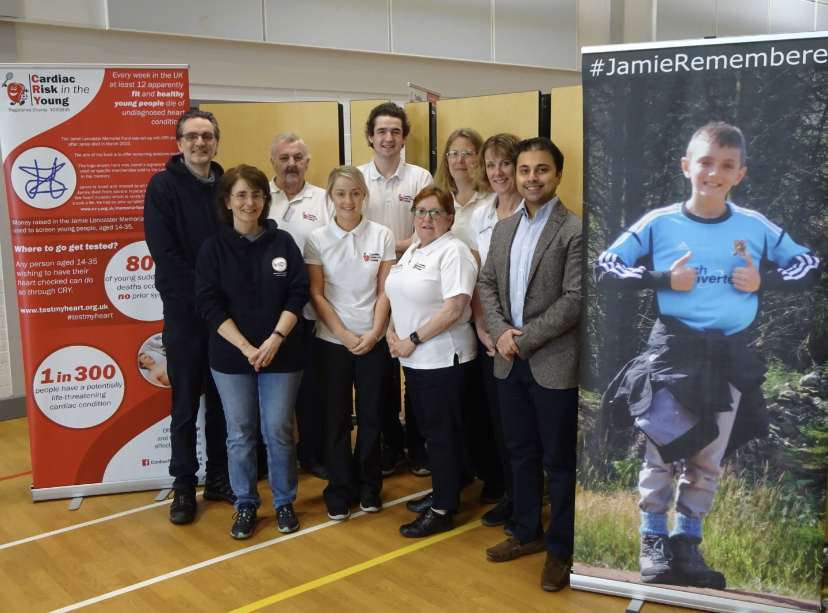
Moreover, the welcome I received from CRY Families (who were hosting the screenings I attended), was always so warm. There was also a great deal of interest shown in the research I was involved with, and I like to think we developed a positive rapport. And, collaborating with an exceptional group of volunteers and CRY staff, I really have developed lifelong friendships along the way.
Through my screening experiences, I know that we successfully identified several individuals with ‘dormant’ cardiac conditions associated with young sudden cardiac death and identified individuals with markers requiring onward evaluation. Assessing risk in the community and communicating this to the individual, their family (and importantly, primary care and secondary care physicians in a timely manner) whilst following up on cases has harnessed the finesse required in the field of inherited cardiac conditions.
Supportive colleagues and team: I would like to acknowledge the incredible nurses, physiologists, doctors and support staff at CRY and St George’s. Some of us, recently participated in the Vitality 10K in London, raising over £10,000 to support the CRY research program. This experience showcased the strong camaraderie and dedication within our team.
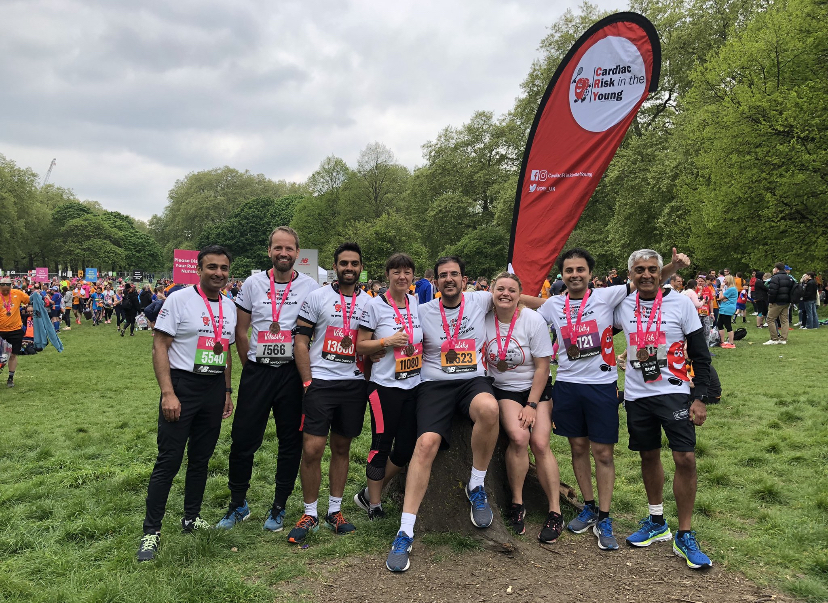
Mentorship and exposure to experts in the field: Under the guidance of Professor Papadakis and Professor Sharma, I have had the opportunity to participate in a weekly inherited cardiac clinic and engage in regular local and regional multidisciplinary team meetings. These experiences have allowed me to develop competencies in managing complex cardiomyopathies, ion channel diseases, and the appraisal of family members following sudden cardiac death.
Additionally, I have gained qualifications in advanced cardiac imaging modalities such as cardiac MRI and worked in the emerging field of sports cardiology, collaborating with prominent organisations like the English Football Association (FA), Rugby Football Union (RFU), England and Wales Cricket Board (ECB), English Institute of Sport (EIS) and British Athletics.
Contributions to Sports Cardiology during the COVID-19 Pandemic: I take particular pride in our contributions to sports cardiology during the novel COVID-19 pandemic. It started with leading a consensus recommendations paper on safe physical activity and exercise during the first wave. Subsequently, we performed a multi-centre study, which was recently published, involving collaborators from various clubs in the UK, the Netherlands, and Brazil, providing valuable insights in this area.
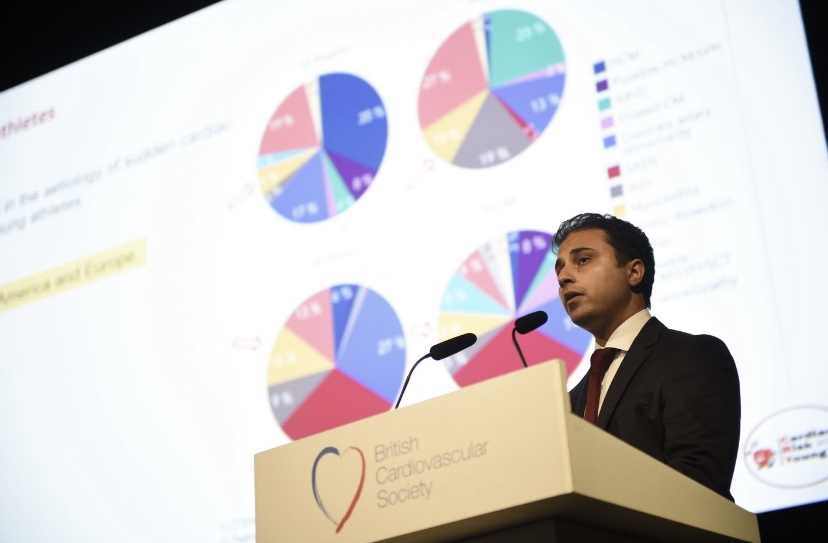
Lecturer: I have had the opportunity to harness my academic potential as a senior lecturer and module lead in the novel Sports Cardiology MSc at St. George’s, University of London under the guidance of Professor Papadakis, Dr Finocchiaro and Professor Sharma. This has involved working closely with our MSc students, guiding them in their dissertations, delivering lectures and developing comprehensive course materials. It has been a rewarding experience to contribute to the growth and development of aspiring professionals in the field.
All of these highlights have enriched my journey and I am grateful for the experiences, collaborations, and friendships that have shaped this chapter of my career.
Where are you now in terms of your CRY journey?
While my initial 1-year fellowship evolved into a 3-year tenure at CRY and St. George’s, and I am now at an exciting juncture as I continue to progress in my career. Currently, I am back in Yorkshire, where I complete the final 12 months of my sub-specialty Cardiology training. This period allows me to enhance my skills and knowledge in a specific area of cardiology while expanding my expertise beyond the scope of my Fellowship.
I am honoured to have recently been appointed as an honorary lecturer at St. George’s, University of London, which allows me to continue my research outputs. Furthermore, I aim to foster close links between my current base hospital, Hull University Teaching Hospitals NHS Trust, and the esteemed team at St. George’s and CRY. Finally, now as a CRY Cardiologist, I am committed to maintaining strong links in the community, as evidenced by facilitating the first in-person CRY myheart support group meeting in London in May 2023 since the COVID-19 pandemic.
The CRY journey certainly continues, and I aspire to continue contributing to this amazing charity.
Do you have any further thoughts and insight you’d like to share with CRY’s ‘community’ or any doctors potentially considering a CRY Research Fellowship?
I have had the privilege of experiencing the positive, diverse and rewarding impact of a CRY Research Fellowship first-hand. The broad exposure facilitates a comprehensive understanding of inherited cardiac conditions and their impact on young individuals and communities. The unique setting of the CRY Research Fellowship offers endless potential for impactful clinical research. Above all, the CRY fellowship encourages future generations of Consultant Cardiologists to think differently and adopt a more holistic approach to patient care by engaging with individuals in the community, raising awareness, and embracing the concept of prevention. By working outside the traditional models of care delivered in a hospital setting, CRY Fellows can truly make an impact by addressing the broader needs of patients and their families.
I am grateful for these transformative experiences and insights gained during my CRY journey, and I encourage anyone considering a clinical research fellowship to apply and embrace the opportunities and possibilities on offer.
